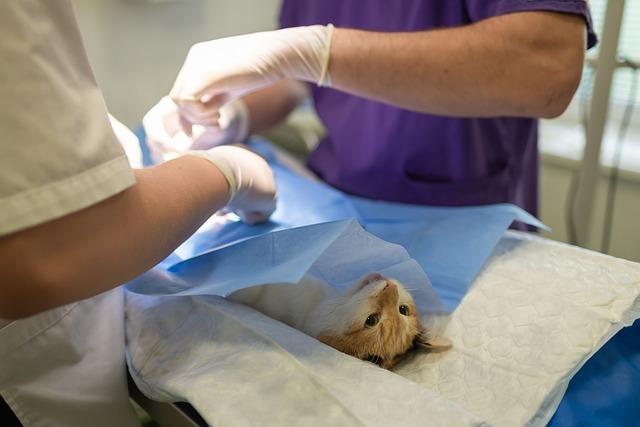Picture this: Your loyal companion, with their graying muzzle and wise, soulful eyes, has been by your side through countless adventures, offering unconditional love and comfort. As our pets grow older, their needs evolve, and ensuring their well-being becomes even more critical. Just like us, senior pets require regular check-ups to maintain their health and catch any potential issues early. But how often should these golden-aged furry friends visit the vet? In this article, we’ll explore the key guidelines for senior pet care, providing you with the insights to keep your beloved companion healthy and happy in their twilight years. So, grab a cozy blanket, snuggle up with your four-legged friend, and let’s dive into the essentials of senior pet veterinary visits.
Understanding Your Senior Pets Health Needs
As our beloved pets age, their health requirements change, making regular veterinary check-ups crucial. Senior pets, typically those over seven years old, benefit from more frequent visits to ensure they stay healthy and happy. A general guideline is to schedule vet appointments every six months. These visits allow for early detection of potential issues, which is vital for managing age-related conditions such as arthritis, diabetes, or kidney disease.
During these check-ups, your vet will likely perform a thorough examination, including:
- Blood tests to monitor organ function
- Dental assessments to prevent and treat oral health problems
- Weight checks to manage obesity or unintended weight loss
- Mobility evaluations to address joint pain and arthritis
Remember, each pet is unique, and your vet may recommend a personalized schedule based on your furry friend’s specific needs. Regular visits are not just about treating illness but also about maintaining quality of life and ensuring your senior pet enjoys their golden years to the fullest.
Signs Your Senior Pet Needs an Extra Vet Visit
As our furry companions age, they may exhibit subtle signs indicating they need more frequent veterinary care. It’s crucial to pay attention to these changes to ensure their well-being. Here are some telltale signs that your senior pet might benefit from an extra vet visit:
- Changes in Appetite or Weight: A sudden increase or decrease in appetite, or noticeable weight loss or gain, can be red flags. These changes might indicate underlying health issues such as dental problems, metabolic disorders, or even cancer.
- Behavioral Shifts: If your pet becomes more lethargic, unusually aggressive, or shows signs of anxiety, it could be a sign of discomfort or pain. Such behavioral changes warrant a thorough veterinary examination.
- Mobility Issues: Difficulty climbing stairs, reluctance to jump, or general stiffness might point to arthritis or other joint-related conditions. Early intervention can greatly improve your pet’s quality of life.
- Frequent Urination or Thirst: Increased frequency of urination or drinking more water than usual can indicate conditions like diabetes or kidney disease. Early detection is key to managing these health issues effectively.
- Skin and Coat Changes: Noticeable hair loss, dry or flaky skin, or the presence of lumps and bumps should be evaluated by a vet to rule out infections, allergies, or tumors.
Being vigilant about these signs and scheduling an extra vet visit when necessary can make a significant difference in maintaining your senior pet’s health and happiness.

Tailoring Vet Visits to Your Senior Pets Unique Health
As our beloved pets age, their health requirements evolve, necessitating more frequent and specialized veterinary visits. Tailoring vet visits for senior pets involves understanding their unique health challenges and providing the appropriate care to ensure their well-being. Here are some considerations:
- Bi-annual check-ups: Senior pets benefit from twice-yearly vet visits to catch and manage age-related issues early.
- Customized care plans: Regular screenings for conditions such as arthritis, dental disease, and organ function should be part of a senior pet’s routine.
- Nutritional adjustments: Discuss dietary changes with your vet to support your pet’s changing metabolism and nutritional needs.
- Pain management: Vets can offer tailored pain relief options to improve your pet’s quality of life.
By closely monitoring your senior pet’s health through personalized vet visits, you can help them enjoy their golden years with comfort and joy.

Building a Lifelong Health Plan for Your Senior Companion
Ensuring your senior pet’s health requires more than just love and cuddles; it demands regular vet visits to catch potential issues early. As pets age, their healthcare needs evolve, and so should their vet visit schedule. Generally, it’s recommended that senior pets see the vet every six months. However, the frequency can vary based on individual health conditions and breed-specific concerns. Here are some key guidelines to consider:
- Twice-Yearly Check-Ups: These visits allow for comprehensive health assessments, including blood work, dental exams, and monitoring of chronic conditions.
- Monitor Weight and Diet: Senior pets often face weight management challenges. Regular vet visits help in adjusting their diet and exercise routines accordingly.
- Watch for Behavioral Changes: Any sudden changes in behavior, such as increased lethargy or irritability, should prompt an immediate vet visit.
- Specialist Referrals: Sometimes, your vet may recommend visits to specialists for conditions like arthritis, heart disease, or diabetes.


































